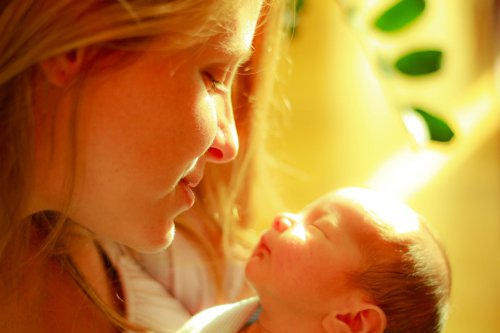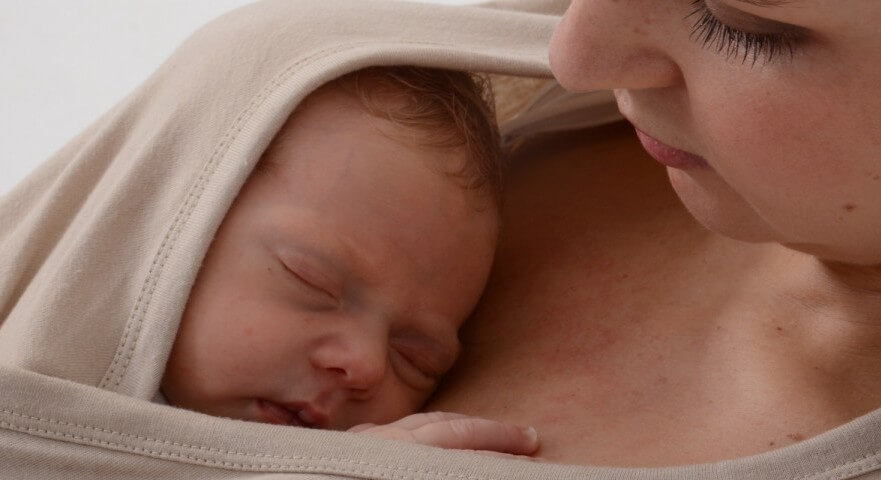A Mother's Touch Soothes Pain in Premature Babies

There is no doubt that the best incubator for premature babies is an embrace in their mother’s arms. It is no wonder that this act of love soothes their pain and improves their tolerance of medical procedures. According to the World Health Organization, nothing equals skin-to-skin contact.
Indeed, there is nothing that a mother’s touch cannot heal. In these individual cases, this act of affection supports and reassures infants who, for whatever reason, arrive earlier than expected in our lives. For this very reason, a mother’s touch is considered more sophisticated and modern than any hospital procedure.
As science has managed to prove for some time: a mom’s lap is extremely beneficial for a premature baby. In various studies r esearchers have concluded that humanist techniques such as Kangaroo Care work wonderfully.
They reduce the occurrence of infection and infant death, prevent stress generated by the sound of incubators add help physical, intellectual, and emotional development of newborns. Most importantly, the little one cannot only sense their mother’s warmth and familiar smell, but also their heartbeat.
A Mother’s Touch, Caressing the Preemie’s Soul
A mother’s touch is felt as a caress to the soul of the premature infant. So much so, that doctors confirm that those children lovingly supported by their mothers during treatment tend not to fuss as much as the rest. Which is to say, this affectionate contact helps with pain tolerance.

That is why throughout the world one thing is known for sure: A newborn’s contact with their mother and father is healthy for the child’s progress. Many neonatologists maintain that skin-to-skin contact regulates the little one’s temperature and stimulates the production of breast milk.
Additionally, these physicians claim that there are even more benefits with this type of contact. Newborns protect their nervous system, stabilize their heart rate and breathe better. That is why a mother’s touch caresses the infant’s being, so that it may overcome its fragility and weakness. That way they can grow happy and healthy.
The most important thing is that children who are fortunate enough to be raised with the Kangaroo Care method experience a shorter recovery period than others. This is also beneficial to fathers, who can reduce the stress and anxiety that having a hospitalized child generates.
Studies on the Importance of a Mother’s Touch
A study conducted by the McGill University in Montreal’s School of Nursing and published by the journal BioMed Central Pediatrics took the world by surprise. Skin-to-skin contact with mothers reduced pain during neonatal testing and treatment.

To this end, the responses were measured in newborns using what is called the “Premature Infant Pain Profile.” With this, the children’s facial expression, pulse and blood oxygen levels were analyzed. Sure enough, the pain in preterm infants was reduced thanks to their mother’s touch.
Those children that were held recovered from the pain after a minute and a half. By contrast, the infants in incubators were still suffering three minutes following the procedure. At a glance the delay appears to be tiny, but it makes a great difference when it comes to the life and health of a child.
One of the examinations that the newborns underwent was the painful neonatal heel prick. This consists of extracting a blood sample from the lower limb for the early detection of diseases. However, that is not all.
Both nature and – in this case – science, definitely always find ways to teach us. As mothers, we have a natural gift. We truly are medicine for our children, specially designed to be good for them. And, as the popular saying goes, “love conquers all.”
All cited sources were thoroughly reviewed by our team to ensure their quality, reliability, currency, and validity. The bibliography of this article was considered reliable and of academic or scientific accuracy.
- Lotto, C. R., & Linhares, M. B. M. (2018). Contacto” Piel a Piel” en la Prevención del Dolor en Bebés Prematuros: Revisión Sistematica de la Literatura. Trends in Psychology, 26(4), 1699-1713. https://www.scielo.br/scielo.php?pid=S2358-18832018000401699&script=sci_abstract&tlng=es
- Martínez-Martínez, T., & Damian-Ferman, N. (2014). Beneficios del contacto piel a piel precoz en la reanimación neonatal. Enfermería universitaria, 11(2), 61-66. https://www.sciencedirect.com/science/article/pii/S1665706314726661
- Brundi, M., González, M. A., Enríquez, D., & Larguía, A. M. (2006). Contacto piel a piel madre/hijo prematuro. Conocimientos y dificultades para su implementación. Revista del hospital materno infantil Ramón Sarda, 25(4), 159-166. https://www.redalyc.org/pdf/912/91225403.pdf